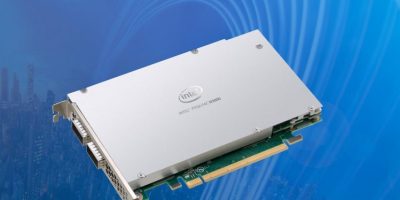Acceleration card delivers 5G
Equipped with an Intel FPGA, the FPGA Programmable Acceleration Card (PAC) N3000 is designed for communications service providers to enable 5G next-generation core and virtualised radio access network solutions.
The FPGA PAC N3000 accelerates many virtualised workloads, ranging from 5G radio access networks to core network applications, says Intel.
“As the mobile and telecommunications industry gears up for an explosion in internet protocol traffic and 5G rollouts, we designed the Intel FPGA PAC N3000 to provide the programmability and flexibility with the performance, power efficiency, density and system integration capabilities the market needs to fully support the capabilities of 5G networks,” says Reynette Au, Intel’s vice president of marketing, Programmable Solutions Group.
Reasons behind the introduction are that telecommunications service providers face rapidly growing usage demands, with global internet protocol (IP) traffic expected to increase threefold over the next five years.The exponential increase of mobile subscribers, IoT devices and 5G use cases adds to the complexity and cost of network building and operations. Many new use cases require low latency and high bandwidth and can generate new revenue streams for the service providers while reducing the total cost of ownership.
“5G is a transformative technology, and it requires advanced network virtualisation infrastructure coupled with an agile software architecture,” observes Ron Parker, chief architect at Affirmed Networks. “Working with an Intel FPGA PAC N3000, we have developed a cloud-native, containerised solution for the 5G core and EPC – the first true 100G/CPU socket solution,” he continues. “The FPGA acceleration allows us to process this traffic load with 50 per cent less CPU utilisation, providing significant room for growth,” he adds.
Intel FPGA PAC N3000 is a customisable platform enabling high throughput, lower latency and high bandwidth applications, says Intel. It allows for optimisation of data plane performance to achieve lower costs while maintaining a high degree of flexibility. Support of end-to end industry standard and open source tools allows users to adapt quickly to evolving workloads and standards.
The PAC is designed to accelerate network traffic for up to 100Gbits per second and supports up to 9Gbyte DDR4 and 144Mbyte QDR IV memory. Customers can tailor solutions by using reference IPs for networking function acceleration workloads such as vRAN, vBNG, vEPC, IPSec and VPP.
Intel FPGA PAC N3000 can be deployed at the 5G edge and network.
Affirmed Networks 5G Core Network will be demonstrated in the Intel booth at MWC in Hall 3 (3E31).




